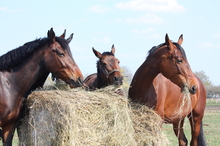Three cases of the neurological form of equine herpesvirus 1 (EHV-1) in horses have been diagnosed by equine veterinarians at the University of Minnesota in horses from a single farm in Wright County.

Continuing threat of EHV-1 in horses
Three new cases of the neurological form of equine herpesvirus 1 (EHV-1) in horses have been diagnosed by equine veterinarians at the University of Minnesota.
Two of the horses are now in isolation at the university’s Large Animal Hospital, a separate facility half a mile away from the Leatherdale Equine Center and Piper Performance Clinic.The third horse was euthanized on the farm, and four remaining horses are being monitored
Tests from one of the hospitalized horses yielded positive confirmation of EHV-1 infection on Wednesday. Tests from the second horse are pending. Since the farm has been closed to horse movements for at least the past six months, there little chance that more horses have been exposed, the university said.
Stringent infection control measures were introduced immediately at both the Leatherdale Equine Center and Large Animal Hospital. Isolation stalls are in use to protect other hospital patients and the equine community at large.
Biosecurity measures in use on campus include physical and airspace quarantine of the affected horses, closure of the Large Animal Hospital to all horses except those that may become affected as part of the outbreak, restriction of access to the Large Animal Hospital to essential personnel only, maintenance of separate veterinary and technical care teams at the Leatherdale Equine Center and Large Animal Hospital, and management of cases by board-certified specialists in Large Animal Internal Medicine and Infection Control.
University of Minnesota said the isolation unit included a sling if either affected horse needs it, and that the isolation capabilities even include separate ventilation and air filtration for the sick horses.
The main large animal hospital, where the sick horses are housed in isolation, is not near the Leatherdale Equine Center, which is located in a separate part of the campus. Officials said that the presence of the two sick horses should not affect any horses at the Equine Center.
Equine herpesvirus-1 is a highly contagious virus that causes respiratory disease, abortion, and intermittent outbreaks of neurologic disease in horses.
There is no evidence that additional horses have been exposed in the Wright County outbreak, but symptoms that should alert horse owners to the possibility of neurologic EHV-1 infection include:
- Fever
- Weakness and poor coordination
- Urine dribbling or inability to urinate
Learn more about Equine Herpesvirus 1
